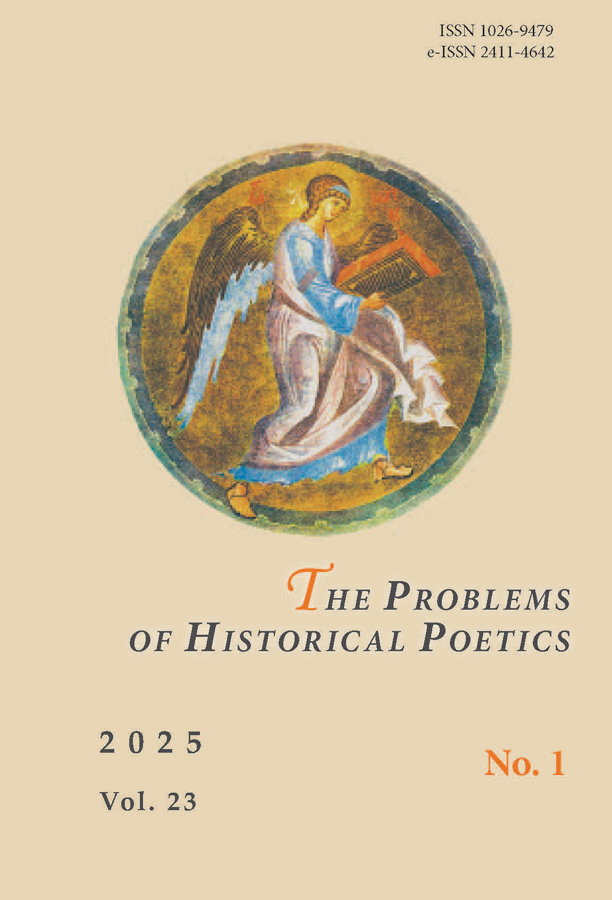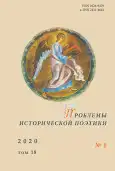The Motifs of Searching for a Sense of Being in the Plot of the Novel by Ivan A. Bunin “The Life of Arseniev”
- Authors: Kovalyova T.N.1
-
Affiliations:
- Pyatigorsk State University
- Issue: Vol 18, No 1 (2020)
- Pages: 276-293
- Section: Articles
- URL: https://bakhtiniada.ru/1026-9479/article/view/285862
- DOI: https://doi.org/10.15393/j9.art.2020.7342
- ID: 285862
Cite item
Full Text
Abstract
The article focuses on the study of the role of the motifs in the development of the plot of Ivan A. Bunin’s novel “The Life of Arseniev”. Investigating the early stages of spiritual formation of the main character of the novel, the author of the article highlights the motifs of loneliness, the feeling of senseless of an imperfect existence, the aspiration to understand the meaning of all things, the highest sense of being, to find the source and sense of an existential despondency — longing for God. The aspiration to find unshakable and eternal values brings Arseniev about to take the unusual road, that is why the motifs of wanderings, encircling and pilgrimage have a significant role in the plot of the novel. The aimless wandering of Arseniev is a reflection of the fact that he has not yet found the highest sense of being, and is opposed to the motif of wandering as a conscious choice of the person, who establishes a certain truth by his own conscious way, that is why the meaning of the pilgrimage and such Christian images as a temple, church, cathedral, monastery, pilgrim, saints attests to the hero’s search for God and for the way to Him. Arseniev’s searches are conditioned by his strivings for an inmost soul that a human soul always imagines, that is by his longing for God, his desire to find the highest sense of being, a true path as the path to God. This conclusion is confirmed by the path of life of the main character which includes the interrelation of motifs of search of a sense and purpose of life, the right path, wanderings, encircling, pilgrimage and also the main iconic images (temple, monastery).
About the authors
Tat’yana N. Kovalyova
Pyatigorsk State University
Author for correspondence.
Email: tatjana_kovaleva@mail.ru
PhD in Philology, Associate Professor of Literature and Pedagogical Technologies of Philological Education
Russian Federation, PyatigorskReferences
- Bakhtin M. M. Forms of Time and Chronotope in the Novel. Essays on Historical Poetics. In: Literaturno-kriticheskie stat’i [Literary-Critical Articles]. Moscow, Khudozhestvennaya literatura Publ., 1986, pp. 121–291. (In Russ.)
- Berdnikova O. A. Reminiscences, Quotations and Motifs of the Psalter in the Works of I. A. Bunin. In: Problemy istoricheskoy poetiki [The Problems of Historical Poetics]. Petrozavodsk, Petrozavodsk State University Publ., 2012, vol. 10, pp. 315–328. Available at: http://poetica.pro/files/redaktor_ pdf/1458029841.pdf (accessed on May 25, 2019). doi: 10.15393/j9. art.2012.362 (In Russ.)
- Veselovskiy A. N. Istoricheskaya poetika [Historical Poetics]. Moscow, Vysshaya shkola Publ., 1989. 404 p. (In Russ.)
- Gasparov B. M. Literaturnye leytmotivy [Literary Leitmotifs]. Moscow, Nauka Publ., 1993. 304 p. (In Russ.)
- Esaulov I. A. Kategoriya sobornosti v russkoy literature [The Category of Sobornost’ in Russian Literature]. Petrozavodsk, Petrozavodsk State University Publ., 1995. 287 p. (In Russ.)
- Esaulov I. A. Paskhal’nost’ russkoy slovesnosti [Paskhal’nost’ of Russian Literature]. Moscow, Krug Publ., 2004. 560 p. (In Russ.)
- Zakharov V. N. Orthodox Aspects of Russian Literature Ethnopoetics. In: Problemy istoricheskoy poetiki [The Problems of Historical Poetics]. Petrozavodsk, Petrozavodsk State University Publ., 1998, vol. 5, pp. 5–30. Available at: http://poetica.pro/journal/article.php?id=2472 (accessed on May 25, 2019). doi: 10.15393/j9.art.1998.2472 (In Russ.)
- Zakharov V. N. Historical Poetics and Its Category. In: Problemy istoricheskoy poetiki [The Problems of Historical Poetics]. Petrozavodsk, Petrozavodsk State University Publ., 1992, vol. 2, pp. 3–9. Available at: http://poetica.pro/ journal/article.php?id=2355 (accessed on May 25, 2019). DOI: 10.15393/ j9.art.1992.2355 (In Russ.)
- Zakharov V. N. Problemy istoricheskoy poetiki. Etnologicheskie aspekty [The Problems of Historical Poetics. Ethnological Aspects]. Moscow, Indrik Publ., 2012. 264 p. (In Russ.)
- Kovaleva T. N. Types of Artistic Time and Their Role in Ivan Bunin’s Novel “the Life of Arseniev”. In: Problemy istoricheskoy poetiki [The Problems of Historical Poetics]. Petrozavodsk, Petrozavodsk State University Publ., 2016, vol. 14, pp. 361–383. Available at: http://poetica.pro/files/redaktor_pdf/1482920692.pdf (accessed on May 25, 2019). doi: 10.15393/j9. art.2016.3603 (In Russ.)
- Kovaleva T. N. The Path of Life by the Will of God in the Novel “the Life of Arseniev” by I. A. Bunin. In: Problemy istoricheskoy poetiki [The Problems of the Historical Poetics]. Petrozavodsk, Petrozavodsk State University Publ., 2017, vol. 15, no. 2, pp 127–140. Available at: http://poetica.pro/files/redak- tor_pdf/1499089355.pdf (accessed on May 25, 2019). doi: 10.15393/j9. art.2017.4381 (In Russ.)
- Kolobaeva L. A. From the Temporary to the Eternal: The Phenomenological Novel in Russian Literature of the 20th Century: “The Life of Arseniev” by I. A. Bunin and “Doctor Zhivago” by B. L. Pasternak. In: Voprosy literatury, 1998, no. 3, pp. 132–144. (In Russ.)
- Lotman Yu. M. About a Subject Space of a Russian Novel of the 19th Century. In: Uchenye zapiski Tartuskogo gosudarstvennogo universiteta [Proceedings of Tartu State University]. Tartu, 1987, issue 746, pp. 102–114. (In Russ.)
- Lotman Yu. M. Izbrannye stat’i [Selected Articles]. Tallinn, Aleksandra Publ., 1993, vol. 1, pp. 386–464. (In Russ.)
- Meletinskiy E. M. Vvedenie v istoricheskuyu poetiku eposa i romana [The Introduction to the Historical Poetics of Epos and Novel]. Moscow, Nauka Publ., 1986. 318 p. (In Russ.)
- Neklyudov S. Yu. About Some Aspects of the Research on Folklore Motifs. In: Fol’klor i etnografiya: u etnograficheskikh istokov fol’klornykh syuzhetov i obrazov [Folklore and Ethnography: at the Ethnographic Origins of Folklore Plots and Images]. Leningrad, Nauka Publ., 1984, pp. 221–229. (In Russ.)
- Putilov B. N. A Motif as a Plot Formation Element. In: Tipologicheskie issledovaniya po fol’kloru: sbornik statey v pamyat’ V. Ya. Proppa [Typological Researches on Folklore: the Collection of Articles in V. Y. Propp’s Memory]. Moscow, 1975, pp. 141–155. (In Russ.)
- Silant’ev I. V. Motiv v sisteme khudozhestvennogo povestvovaniya [A Motif in the System of Artistic Narrative]. Novosibirsk, IDMI Publ., 2001. 236 p. (In Russ.)
- Silant’ev I. V. Poetika motiva [The Poetics of a Motif ]. Moscow, Yazyki slavyanskoy kul’tury Publ., 2004. 296 p. (In Russ.)
- Sobolev N. I. The Issues of Narrative Poetics in the Creative History of the Short Novel “Crossroads” by I. S. Shmelev. In: Problemy istoricheskoy poetiki [The Problems of Historical Poetics]. Petrozavodsk, Petrozavodsk State University Publ., 2015, issue 13, pp. 492–506. Available at: http://poetica. pro/files/redaktor_pdf/1456403022.pdf (accessed on May 25, 2019). doi: 10.15393/j9.art.2015.3450 (In Russ.)
- Tomashevskiy B. V. Teoriya literatury. Poetika [Theory of Literature. Poetics]. Moscow, Aspect Press Publ., 1996. 334 p. (In Russ.)
- Toporov V. N. Space and the Text. In: Tekst: semantika i struktura [Text: Semantics and Structure]. Мoscow, Nauka Publ., 1983, pp. 227–284. (In Russ.)
- Tyupa V. I., Romodanovskaya E. K. A Dictionary of Motifs as a Scientific Problem. In: Materialy k slovaryu syuzhetov i motivov russkoy literatury: ot syuzheta k motivu [Materials for a Dictionary of Plots and Motifs of Russian Literature: From Plot to Motif ]. Novosibirsk, 1996, pp. 3–15. (In Russ.)
- Theophan Zatvornik, Saint. Chto est’ dukhovnaya zhizn’ i kak na nee nastroit’sya [What Is a Spiritual Life and How to Set One’s Heart on It]. Moscow, Pravilo very Publ., 1996. 336 p. (In Russ.)
- Freydenberg O. M. Poetika syuzheta i zhanra [The Poetics of Plot and Genre]. Moscow, Labirint Publ., 1997. 448 p. (In Russ.)
Supplementary files











